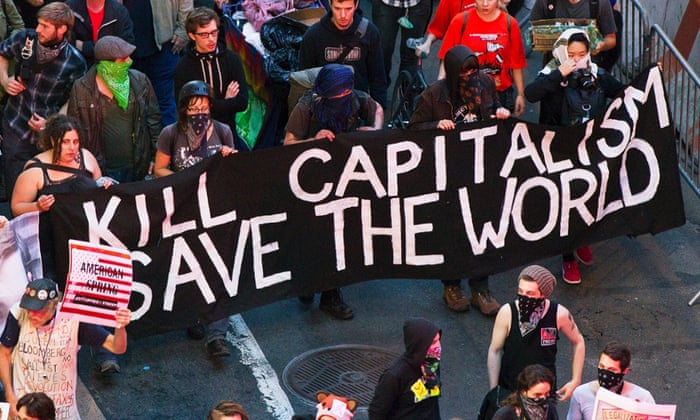TBF
TBF's JournalCan the working class still change the world?
Kyle Brown ~ April 14, 2015
IN HIS famous speech "Where Do We Go From Here?" Martin Luther King Jr. quoted the then-president of the United Auto Workers (UAW) union, Walter Reuther, saying, "Power is the ability of a labor union like the UAW to make the most powerful corporation in the world, General Motors, say 'Yes' when it wants to say 'No.'"
This question of power continues to be posed for activists today. Where does the power lie to defend the Occupy encampments and the movement when the most powerful state in the world decides to carry out repression? Where does the power lie for the Black Lives Matter movement to actually realize the popular chant "shut it down" in order to win some of its demands for justice?
With labor unions and strike action at historic lows today, it's understandable that few people immediately think of the working class as the answer to those questions.
But contrary to the popular view, held even among people on the left, the vast social changes that have taken place since King's time and before haven't eliminated the potential of the working class as the key social force able to transform society and pose a radical alternative to capitalism. In fact, the working class is still, as Karl Marx and Frederick Engels put it in The Communist Manifesto more than 160 years ago, capitalism's potential "gravediggers." ...
More here: http://socialistworker.org/2015/04/14/can-workers-still-change-the-world

The Power of the People
I saw this on the "God" Facebook page, and then found a jpeg via Google. Applicable to religion or politicians - especially the ones who preach austerity for all but the 1%.
Such an amazing message captured in this meme:

Kill Capitalism ~ Save the World
It will take 100 years for the world’s poorest people to earn $1.25 a day
Jason Hickel ~ Jason Hickel is an anthropologist at the London School of Economics. Follow @jasonhickel on Twitter
Monday 30 March 2015 03.00 EDT
If you follow international news you will be accustomed to headlines announcing that world leaders have succeeded in cutting global poverty in half over the past couple of decades. Its sounds like brilliant news, but it’s just not true. The numbers have been furtively manipulated to make it seem as though our economic system is working for the majority of humanity when in fact it is not.
The sustainable development goals, to be decided in September, will take this dubious good-news story a step further. This time, the main goal is not just to further reduce extreme poverty, but to eradicate it entirely – and to do so by no later than 2030. This is a welcome move: it’s about time we finally got around to putting poverty eradication firmly on the agenda. But it also raises some tough questions. Is it possible to end poverty under our current economic system?
A few weeks ago economist David Woodward tackled this question in an article published in the World Economic Review. His findings are shocking. He shows that, given our existing economic model, poverty eradication can’t happen. Not that it probably won’t happen, but that it physically can’t. It’s a structural impossibility ...
http://www.theguardian.com/global-development-professionals-network/2015/mar/30/it-will-take-100-years-for-the-worlds-poorest-people-to-earn-125-a-day?CMP=fb_gu

144 years ago today
"Citizens: If you are able to make the Revolution’s victory of March 18th definitive, it will remain one of the greatest moments in the history of humanity."

More good photos here: https://robertgraham.wordpress.com/2014/10/04/the-first-international-and-the-paris-commune/
Marx on the Paris Commune: https://www.marxists.org/archive/marx/works/1871/civil-war-france/ch05.htm
Rosa Luxemburg was born on this day in 1871 -
Rosa Luxemburg, founder of the Spartacus League, brutally murdered by proto-fascists in January 1919, was born on this day in 1871, just two weeks before the Paris Commune took hold. Two months after her death, in its new International Relations Section, basically an aggregation of press clippings and documents from overseas, The Nation published the full text of the Spartacist Manifesto: “Arise and face the struggle! Arise and act!” In 2011, Vivian Gornick reviewed a collection of Luxemburg’s letters, under the headline, “History and Heartbreak.”
When I was a child, Rosa Luxemburg’s name would sometimes be mentioned with awe in my slightly irreverent left-wing household. Who was she? I’d ask. A great socialist, I’d be told. She criticized Lenin. She was assassinated. For years I thought the Soviets had murdered her. In a sense, I wasn’t so far off. In 1931 Joseph Stalin had Luxemburg “excommunicated” from the canon of Marxist heroes. If she’d been living in his Russia she’d certainly have been eliminated. No revolutionary as independent-minded as she could fail, come the revolution, to be denounced as a counterrevolutionary….
There she was: a girl, a Jew, a cripple—possessed of an electrifying intelligence, a defensively arrogant tongue and an unaccountable passion for social justice, which, in her teens, led her to the illegal socialist organizations then abounding among university students in Warsaw. In the city’s radical underground, she opened her mouth to speak and found that thought and feeling came swiftly together through an eloquence that stirred those who agreed with her, and overwhelmed those who did not. The experience was exhilirating; more than exhilirating, it was clarifying; it centered her, told her who she was….
http://www.thenation.com/blog/200289/march-5-1871-rosa-luxemburg-born

Counting on Billionaires
Philanthrocapitalists like George Soros want us to believe they can remedy the economic misery that they themselves create ... by Japhy Wilson 3-3-15
"In the tale that I am about to tell, we will see how Soros is not only “taking money in at one end and pushing it out at the other,” but is also eating the stuff that comes out at the other end."
Philanthrocapitalism is the latest “great white hope” of international development. Unlike traditional philanthropists, who were content to write checks for good causes, “philanthrocapitalists” like Bill Gates and George Soros have supposedly transformed development aid by infusing it with the business principles of innovation, efficiency, and enterprise.
Michael Green and Matthew Bishop (US business editor of the Economist) celebrate this transformation in their best-selling book, Philanthrocapitalism: How the Rich Can Save the World and Why We Should Let Them. Bishop and Green argue that philanthrocapitalism is a “new social contract,” in which increasing inequality is to be accepted in exchange for “the rich regarding their surplus wealth as the property of the many, and themselves as trustees whose duty it is to administer it for the common good.”
Should the rich not be sufficiently generous, they warn, “they risk provoking the public into a political backlash against the economic system that allowed them to become so wealthy.” This danger is well understood by “the leading beneficiaries of the winner-takes-all society, [who] worry increasingly about the political risks of growing inequality and are concluding that philanthropy may be one of the best ways to manage those risks.”
In a characteristically amusing and suggestive metaphor, Slavoj Žižek has likened this ideological strategy to the phenomenon of chocolate laxatives: each presents the cause of the problem — chocolate constipates, capitalism impoverishes — as the solution to its own pathological symptoms. Žižek’s favored example is Soros: speculator, philanthropist, and one of the wealthiest men in the world ...
Read more here (fascinating story giving an example of Soros Millenium Villages project): https://www.jacobinmag.com/2015/03/george-soros-philanthrocapitalism-millennium-villages/

As Cuba Shifts Toward Capitalism, Inequality Grows More Visible
By RANDAL C. ARCHIBOLDFEB. 24, 2015
HAVANA — The river where Jonas Echevarria fishes cuts through neighborhoods brimming with new fine restaurants, spas and boutiques, springing up in Cuba’s accelerating push toward private enterprise. Tattered mansions and luxury apartment blocks speak of old wealth and new. A bounty of private restaurants known as paladares serve pork tenderloin, filet mignon and orange duck to tourists, Cuban-Americans visiting relatives and a growing pool of Cuban entrepreneurs with cash to spend.
These were things Mr. Echevarria, with only a few eggs, some plantains and a handful of rolls in his pantry, would not be having for dinner. In his neighborhood, a shantytown called Little Swamp on the fringe of the Rio Almendares and the margins of society, few people have relatives sending money from abroad, food rations barely last the month, and homes made of corrugated tin, wood scraps and crumbling concrete fail to keep out floodwaters. Nobody goes to paladares, much less has the money to start one.
As Cuba opens the door wider to private enterprise, the gap between the haves and have-nots — and between whites and blacks — that the revolution sought to diminish is growing more evident ...
More here: http://www.nytimes.com/2015/02/25/world/americas/as-cuba-shifts-toward-capitalism-inequality-grows-more-visible.html?hp&action=click&pgtype=Homepage&module=photo-spot-region®ion=top-news&WT.nav=top-news&_r=0

Even Better Than a Tax Cut
The Opinion Pages | Op-Ed Contributor
Even Better Than a Tax Cut
By LAWRENCE MISHELFEB. 23, 2015
WASHINGTON — WITH the early stages of the 2016 presidential campaign underway and millions of Americans still hurting financially, both parties are looking for ways to address wage stagnation. That’s the good news. The bad news is that both parties are offering tax cuts as a solution. What has hurt workers’ paychecks is not what the government takes out, but what their employers no longer put in — a dynamic that tax cuts cannot eliminate.
Wage stagnation is a decades-long phenomenon. Between 1979 and 2014, while the gross domestic product grew 150 percent and productivity grew 75 percent, the inflation-adjusted hourly wage of the median worker rose just 5.6 percent — less than 0.2 percent a year. And since 2002, the bottom 80 percent of wage earners, including both male and female college graduates, have actually seen their wages stagnate or fall.
At the same time, taxation does not explain why middle-income families are having a harder time making ends meet, even as they increase their education and become ever more productive. According to the latest Congressional Budget Office data, the middle 60 percent of families paid just 3.2 percent of their income in federal income taxes in 2011, less than half what they paid in 1979.
Yes, a one-time reduction in taxes through, say, expanded child care credits or a secondary earner tax break, as Democrats propose, could help families. But as wages continue to stagnate, it is impossible to continuously cut taxes and still pay for things like education and social programs for the growing population of older Americans ...
More here: http://www.nytimes.com/2015/02/23/opinion/even-better-than-a-tax-cut.html?hp&action=click&pgtype=Homepage&module=c-column-top-span-region®ion=c-column-top-span-region&WT.nav=c-column-top-span-region&_r=0
The numbers tell the story -

The Shrinking American Labor Union
FEB. 7, 2015
24.2%: private sector union membership rate, 1973
6.6%: private sector union membership rate, 2014
Source: Barry T. Hirsch and David A. Macpherson
A generation ago labor unions were often a familiar feature of the American workplace, but in private businesses across the country, unions have been shrinking. Today fewer than one in 15 private sector workers belongs to a union, compared with almost one in four back in 1973.
But dwindling union participation in the private sector stands in stark contrast with union membership among public sector workers, which rose sharply in the 1970s and has been relatively steady since 1980 at around 35 percent. Overall union membership has fallen by about a half since 1983, according to the Bureau of Labor Statistics, driven entirely by the decline in the private sector.
The causes of falling union participation are hard to pinpoint but may be attributed to several factors, including the pressures of global trade, technological change, the shift away from domestic manufacturing and a tougher stance against unions from government and corporate leaders ...
more here: http://www.nytimes.com/2015/02/08/business/the-shrinking-american-labor-union.html?mabReward=R4&action=click&contentCollection=Books®ion=Footer&module=Recommendation&src=recg&pgtype=article
Profile Information
Gender: FemaleHometown: Wisconsin
Current location: Tejas
Member since: Thu Jan 17, 2008, 01:44 PM
Number of posts: 32,100
